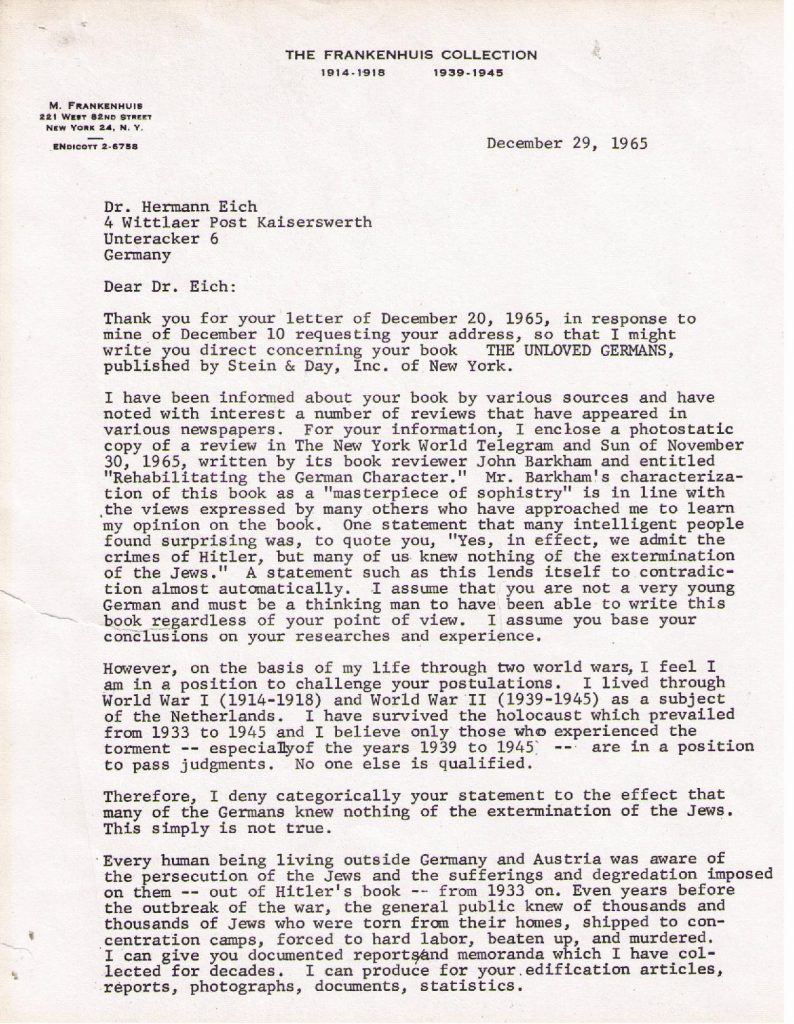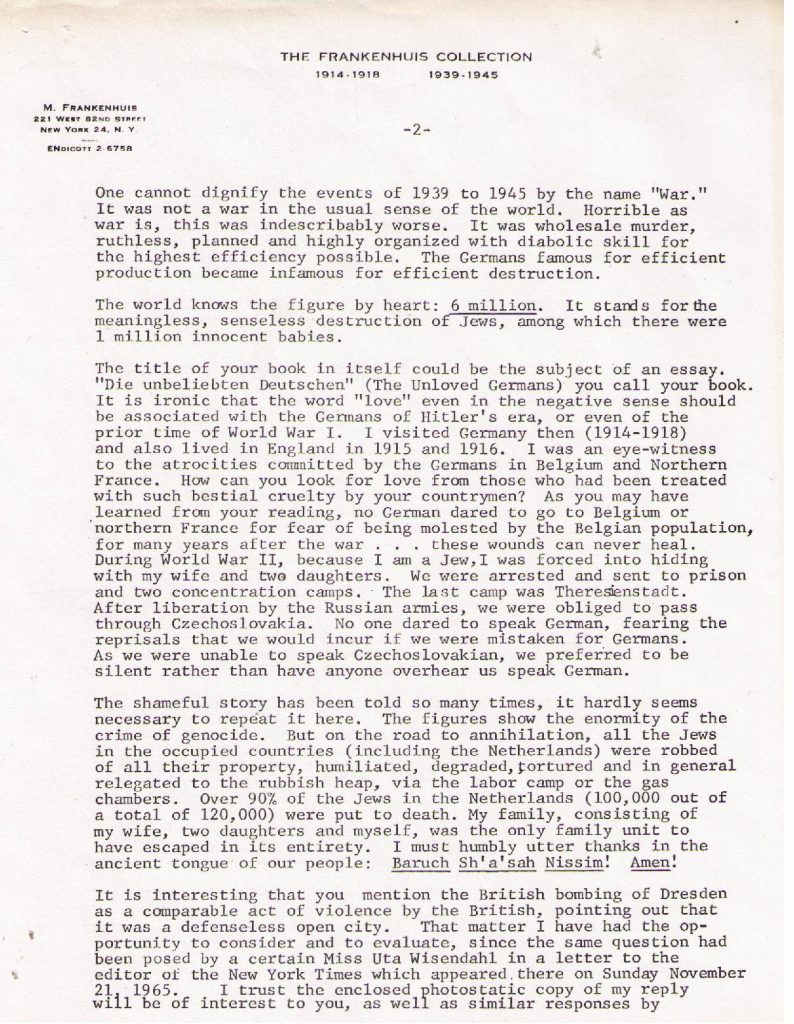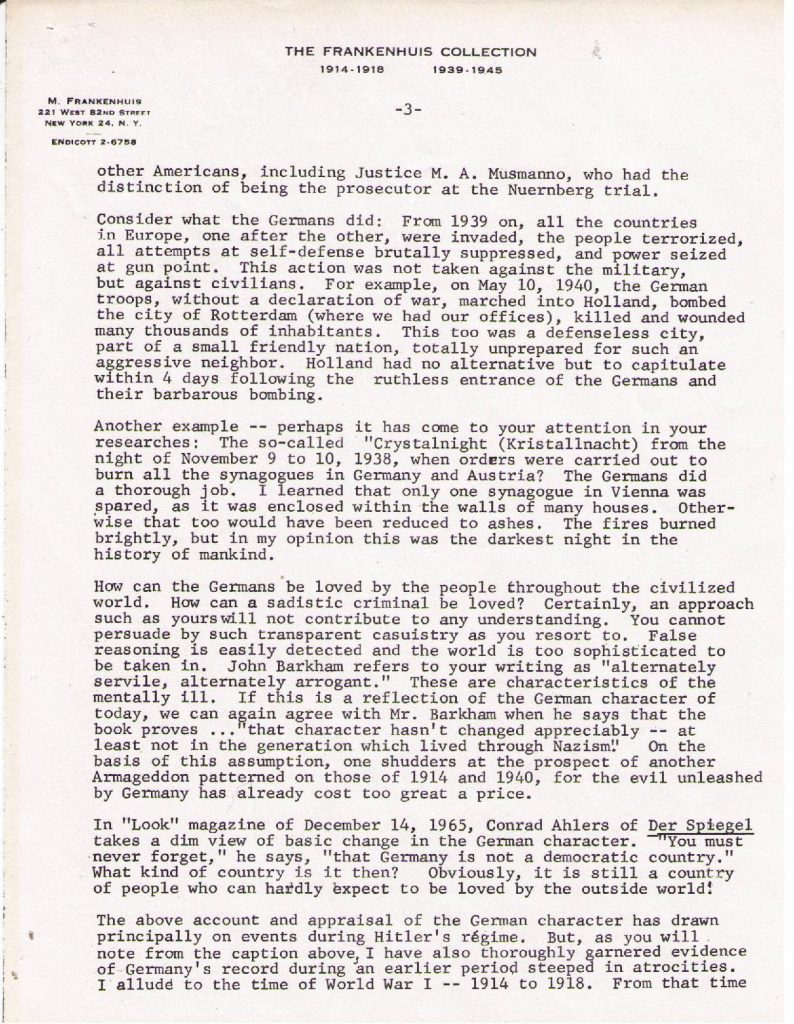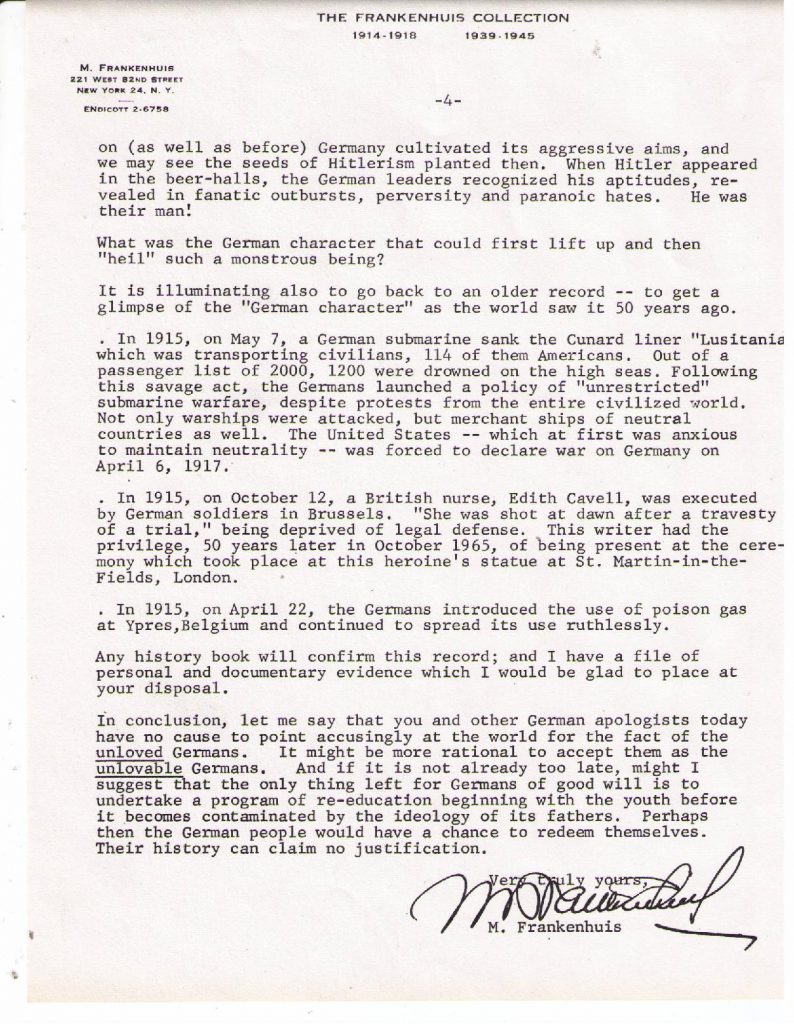Dr. Hermann Eich
In conclusion, let me say that you and other German apologists today have no cause to point accusingly at the world for the fact of the unloved Germans. It might be more rational to accept them as the unlovable Germans. And if it is not already too late, might I suggest that the only thing left for Germans of good will is to undertake a program of re-education beginning with the youth before it becomes contaminated by the ideology of its fathers. Perhaps then the German people would have a chance to redeem themselves. Their history can claim no justification. See full letter from M. Frankenhuis below





December 29, 1965
Dr. Hermann Eich
4 Wittlaer Post Kaiserswerth Unteracker 6
Germany
Dear Dr. Eich:
Thank you for your letter of December 20, 1965, in response to mine of December 10 requesting your address, so that I might write you direct concerning your book THE UNLOVED GERMANS, published by Stein & Day, Inc. of New York.
I have been informed about your book by various sources and have noted with interest a number of reviews that have appeared in various newspapers. For your information, I enclose a photostatic copy of a review in The New York World Telegram and Sun of November 30, 1965, written by its book reviewer John Barkham and entitled “Rehabilitating the German Character.” Mr. Barkham’s characterization of this book as a “masterpiece of sophistry” is in line with the views expressed by many others who have approached me to learn my opinion on the book. One statement that many intelligent people found surprising was, to quote you, “Yes, in effect, we admit the crimes of Hitler, but many of us knew nothing of the extermination of the Jews.” A statement such as this lends itself to contradiction almost automatically. I assume that you are not a very young
German and must be a thinking man to have been able to write this book regardless of your point of view. I assume you base your conclusions on your researches and experience.
However, on the basis of my life through two world wars, I feel I am in a position to challenge your postulations. I lived through World War I (1914-1918) and World War II (1939-1945) as a subject of the Netherlands. I have survived the holocaust which prevailed from 1933 to 1945 and I believe only those who experienced the torment — especially of the years 1939 to 1945 — are in a position to pass judgments. No one else is qualified.
Therefore, I deny categorically your statement to the effect that many of the Germans knew nothing of the extermination of the Jews. This simply is not true.
Every human being living outside Germany and Austria was aware of the persecution of the Jews and the sufferings and degradation imposed on them — out of Hitler’s book — from 1933 on. Even years before the outbreak of the war, the general public knew of thousands and thousands of Jews who were torn from their homes, shipped to concentration camps, forced to hard labor, beaten up, and murdered. I can give you documented reports and memoranda which I have collected for decades. I can produce for your edification articles, reports, photographs, documents, statistics.
One cannot dignify the events of 1939 to 1945 by the name “War.” It was not a war in the usual sense of the world. Horrible as war is, this was indescribably worse. It was wholesale murder, ruthless, planned and highly organized with diabolic skill for the highest efficiency possible. The Germans famous for efficient production became infamous for efficient destruction.
The world knows the figure by heart: 6 million. It stands for the meaningless, senseless destruction of Jews, among which there were 1 million innocent babies.
The title of your book in itself could be the subject of an essay. “Die unbeliebten Deutschen” (The Unloved Germans) you call your book. It is ironic that the word “love” even in the negative sense should be associated with the Germans of Hitler’s era, or even of the prior time of World War I. I visited Germany then (1914-1918) and also lived in England in 1915 and 1916. I was an eye-witness to the atrocities committed by the Germans in Belgium and Northern France. How can you look for love from those who had been treated with such bestial cruelty by your countrymen? As you may have learned from your reading, no German dared to go to Belgium or northern France for fear of being molested by the Belgian population, for many years after the war . . . these wounds can never heal. During World War II, because I am a Jew, I was forced into hiding with my wife and two daughters. We were arrested and sent to prison and two concentration camps. The Last camp was Theresienstadt. After liberation by the Russian armies, we were obliged to pass through Czechoslovakia. No one dared to speak German, fearing the reprisals that we would incur if we were mistaken for Germans. As we were unable to speak Czechoslovakian, we preferred to be silent rather than have anyone overhear us speak German.
The shameful story has been told so many times, it hardly seems necessary to repeat it here. The figures show the enormity of the crime of genocide. But on the road to annihilation, all the Jews in the occupied countries (including the Netherlands) were robbed of all their property, humiliated, degraded, tortured and in general relegated to the rubbish heap, via the labor camp or the gas chambers. Over 907 of the Jews in the Netherlands (100,000 out of a total of 120,000) were put to death. My family, consisting of my wife, two daughters and myself, was the only family unit to have escaped in its entirety. I must humbly utter thanks in the ancient tongue of our people: Baruch Sh’a’sah Nissim! Amen!
It is interesting that you mention the British bombing of Dresden as a comparable act of violence by the British, pointing out that it was a defenseless open city. That matter I have had the opportunity to consider and to evaluate, since the same question had been posed by a certain Miss Uta Wisendahl in a letter to the editor of the New York Times which appeared, there on Sunday November 21, 1965. I trust the enclosed photostatic copy of my reply will be of interest to you, as well as similar responses by other Americans, including Justice M. A. Musmanno, who had the distinction of being the prosecutor at the Nurnberg trial.
Consider what the Germans did: From 1939 on, all the countries in Europe, one after the other, were invaded, the people terrorized, all attempts at self-defense brutally suppressed, and power seized at gun point. This action was not taken against the military, but against civilians. For example, on May 10, 1940, the German troops, without a declaration of war, marched into Holland, bombed the city of Rotterdam (where we had our offices), killed and wounded many thousands of inhabitants. This too was a defenseless city, part of a small friendly nation, totally unprepared for such an aggressive neighbor. Holland had no alternative but to capitulate within 4 days following the ruthless entrance of the Germans and their barbarous bombing.
Another example — perhaps it has come to your attention in your researches: The so-called “Crystalnight (Kristallnacht) from the night of November 9 to 10, 1938, when orders were carried out to burn all the synagogues in Germany and Austria? The Germans did a thorough job. I learned that only one synagogue in Vienna was spared, as it was enclosed within the walls of many houses. Otherwise that too would have been reduced to ashes. The fires burned brightly, but in my opinion this was the darkest night in the history of mankind.
How can the Germans be loved by the people throughout the civilized world. How can a sadistic criminal be loved? Certainly, an approach such as yours will not contribute to any understanding. You cannot persuade by such transparent casuistry as you resort to. False reasoning is easily detected and the world is too sophisticated to be taken in. John Barkham refers to your writing as “alternately servile, alternately arrogant.” These are characteristics of the mentally ill. If this is a reflection of the German character of today, we can again agree with Mr. Barkham when he says that the book proves …”that character hasn’t changed appreciably — at least not in the generation which lived through Nazism:’ On the basis of this assumption, one shudders at the prospect of another Armageddon patterned on those of 1914 and 1940, for the evil unleashed by Germany has already cost too great a price.
In “Look” magazine of December 14, 1965, Conrad Ahlers of Der Spiegel takes a dim view of basic change in the German character. “You must never forget,” he says, “that Germany is not a democratic country.” What kind of country is it then? Obviously, it is still a country of people who can hardly expect to be loved by the outside world!
The above account and appraisal of the German character has drawn principally on events during Hitler’s regime. But, as you will note from the caption above, I have also thoroughly garnered evidence of Germany’s record during an earlier period steeped in atrocities. I allude to the time of World War I — 1914 to 1918. From that time on (as well as before) Germany cultivated its aggressive aims, and we may see the seeds of Hitlerism planted then. When Hitler appeared in the beer-halls, the German leaders recognized his aptitudes, revealed in fanatic outbursts, perversity and paranoic hates. He was their man!
What was the German character that could first lift up and then “hell” such a monstrous being?
It is illuminating also to go back to an older record — to get a glimpse of the “German character” as the world saw it 50 years ago.
• In 1915, on May 7, a German submarine sank the Cunard liner “Lusitania which was transporting civilians, 114 of them Americans. Out of a passenger list of 2000, 1200 were drowned on the high seas. Following this savage act, the Germans launched a policy of “unrestricted” submarine warfare, despite protests from the entire civilized world. Not only warships were attacked, but merchant ships of neutral countries as well. The United States — which at first was anxious to maintain neutrality — was forced to declare war on Germany on April 6, 1917.
• In 1915, on October 12, a British nurse, Edith Cavell, was executed by German soldiers in Brussels. “She was shot at dawn after a travesty of a trial,” being deprived of legal defense. This writer had the privilege, 50 years later in October 1965, of being present at the ceremony which took place at this heroine’s statue at St. Martin-in-the-Fields, London.
• In 1915, on April 22, the Germans introduced the use of poison gas at Ypres, Belgium and continued to spread its use ruthlessly.
Any history book will confirm this record; and I have a file of personal and documentary evidence which I would be glad to place at your disposal.
In conclusion, let me say that you and other German apologists today have no cause to point accusingly at the world for the fact of the unloved Germans. It might be more rational to accept them as the unlovable Germans. And if it is not already too late, might I suggest that the only thing left for Germans of good will is to undertake a program of re-education beginning with the youth before it becomes contaminated by the ideology of its fathers. Perhaps then the German people would have a chance to redeem themselves. Their history can claim no justification.
Very truly yours,
M. Frankenhuis